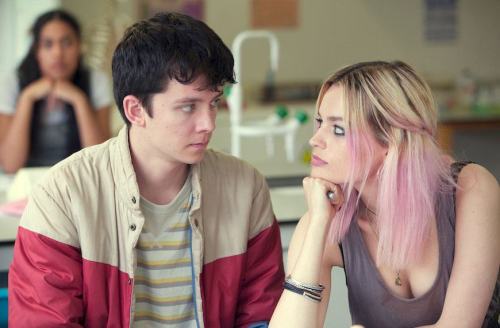Allow me to set the stage for the one and only childhood memory I have of sex education. I’m in middle school—with a greasy AF middle part in my hair, no less—in Charleston, South Carolina. The physical education teacher has just revealed that my class will be skipping the next installment of our four square unit (really!) in favor of something that doesn’t require changing into scratchy gym clothes. We’re all psyched. That is, until the guidance counselor strides across the gymnasium floor and begins handing out index cards: “Write down any questions you have about sex,” she says. “They’ll be anonymous.”
As I hold the piece of paper in hand, I can think of only one query that needs an answer: How can I have a question about something I know next to nothing about?
Flash forward a decade and it blows my mind that I possessed the strategic moves to become “King” in a schoolyard game, but I still didn’t know a single fact about the etiquette, laws, and complex societal standards that rule my body. What’s worse, I’d never given a second thought to this lack of curriculum surrounding puberty until I watched Netflix’s Sex Education, which started streaming January 11th. I learned more about sex in five minutes of watching the show than I did in the extent of my time in school. And now, I’m wondering why.
How can I have a question about something I know next to nothing about?
Sex Education stars 16-year-old Otis (Asa Butterfield), who is seen as something of a high-school sex advice expert after a fellow classmate, Maeve (Emma Mackey), discovers that his mom works as a sex therapist. No surprise: Everyone spends a lot of time doing it, wishing they were doing it, or wondering why they’re not good enough to be doing it. It’s quirky, raw, and above all, it hits on the nuances of sex and real life scenarios that just aren’t as cut and dry as “you slide the condom over the banana.” A few examples: Otis struggles to finish while masturbating; Maeve’s best friend Aimee (Aimee Lou Wood) also masturbates to find out what she likes; a couple has trouble syncing up their libidos because one partner has been cheating; Otis’ best friend Eric (Ncuti Gatwa) experiments with expressing sexuality through his wardrobe. There’s a lot going on.
My high-school experience differed ever so slightly. Through junior year, I went to a private Catholic institution that didn’t offer much in terms of education about sex beyond don’t have it until marriage. By the time I made the switch to my county’s public school, it was too late to learn what I really needed to know—that ship had sailed with my classmates already aboard. To find out what I might have learned had my sex education extended past a blank note card, I sent my alma mater an email. Soon, I was emailing with my high school counselor, Holly Kut, now the district instructional specialist for health and physical education for the Charleston County School District.
Everyone spends a lot of time doing it, wishing they were doing it, or wondering why they’re not good enough to be doing it.
“Sex education starts in sixth grade as an age appropriate curriculum that covers body changes, puberty, and simple aspects of reproduction,” she tells me, noting that 750 minutes (12.5 hours) of education are to be completed by the end of high school.
“The outcomes for this course at the middle and high school level are to provide our students with enough medically accurate information for them to understand the concepts of reproduction, disease prevention, pregnancy prevention, and the importance of abstinence during adolescence as it pertains to their mental, physical, and social health.” While students are told about how various forms of birth control work, they don’t walk away from any lesson with condoms in hand, she tells me.
Sex education guidelines vary from state to state, dictating what students learn as part of the curriculum, including whether or not abstinence and birth control should be presented in the classroom, if gender and sexual orientation will be discussed, and, yes—if the school is bound to teach sex ed at all (e.g., Texas, Alabama, and Kentucky don’t require schools to teach a comprehensive sex education program.) Meanwhile, in England, sex education (called Relationships and Sex Education, or RSE for short) will be compulsory by the year 2020, reports The International Planned Parenthood Federation. Advocates for sex education have created a proposal that takes into account what elementary school kids think they should be taught. And if you ask me (and my fictional pals from Sex Education), they’re onto something.
As adults, we each have our own opinions about what we should have learned in high school when it comes to getting hot and heavy. Hey, I don’t agree with how South Carolina handles certain topics. Studies suggest that making condoms available on school grounds is associated with more students using them and fewer unintended pregnancies. A wealth of research indicates that abstinence-only education programs are not effective in preventing unwanted teen pregnancies. Furthermore, the general nature of my home state’s rules leads me to believe that people with non-heteronormative sexualities and non-binary genders likely leave the classroom without any new insight pertaining to their bodies or sexual health. But I’ve reached these conclusions retrospectively as an adult with time to understand how my own education about sex could have used an upgrade.
When we’re adolescents, as Sex Education articulates so well, we all crave something beyond the logistics of what goes where. And when. We want to know how sex will define the person we become. We want someone to tell us—as Otis’ mom does—that not feeling “normal” is normal. Hey, I’m almost 23 years old and I’m still waiting for someone to hand me an index card that reads simply: “You make the rules.”
Here’s why sex experts want you to think of sex in terms of quality over quantity. And how to use tantric techniques to make your sex life seriously steamy.
Sign Up for Our Daily Newsletter
Get all the latest in wellness, trends, food, fitness, beauty, and more delivered right to your inbox.
Got it, you've been added to our email list.











